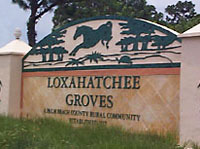The Loxahatchee Groves Water Control District Board of Supervisors on Monday started the process for a forensic audit on a $2.6 million bank loan that was taken out to finance road paving with open-graded emulsion mix (OGEM).
The actions precede the district’s plan to turn over about $300,000 in bond money to the town that remains for maintenance of several paved roads that have been transferred to the town’s control.
In related business, the board also approved a procurement policy to address transparency, contract negotiations, competition, written contracts, documentation, monitoring and integrity.
On July 24, the board directed its staff to obtain three written proposals for a forensic audit of the bank loan and a separate audit of general district operations over the past five years that would include an investigation of district employees, equipment, policies, procedures and contract review.
LGWCD Attorney Mary Viator said that state statutes regulating special districts require that the district request proposals when seeking a forensic auditor.
“What we will do is prepare a request for proposals (RFP), as well as a backup or explanation for the proposed areas that we would like to have audited, and then we can go ahead and advertise,” Viator said, adding that the board of supervisors would need to vote to sit as the selection committee to determine the qualifications of the applicants.
The board would also need to determine areas for the auditor to examine, whether it is the loan alone or the district itself.
“The first question is the procedure and the second issue would be the scope,” she said. “It’s very common for the board to sit as the selection committee.”
Supervisor Simon Fernandez made a motion for the board to sit as the selection committee, which carried 5-0. LGWCD Chair Anita Kane said the audit must be very specific, whether it be into the OGEM paving, contracts or the bank loan that was taken out.
“I think we should do the OGEM first, and then decide after that if and when we want to do the district for however many years,” Kane said. “The other part is what do we want included? Do we want contracts, employees? We have to be very specific in the RFP about what we want included.”
Fernandez was concerned about the cost of the audit. After speaking with LGWCD Administrator Steve Yohe, he thought looking at the loan first would be the best strategy. “Anything else that we add on, it will cost,” he said, adding that misappropriation of materials might not be revealed in an audit if detailed records were not kept. “I would recommend that we all get familiarized with the modus operandi that they had before we assign the scope of work that we want out of it.”
Kane said she had spoken with an experienced forensic auditor who told her that although they might not be able to find where materials went, she might be able to point out methods to put in place where they will be better accounted for.
She agreed with Fernandez that the loan might be the first aspect to audit, and then go to more specific areas, such as employees, contracts, procedures and purchasing.
Fernandez said his main concern was to see that the money from the loan was not handled improperly. He suggested going back one year prior to when Yohe was hired four years ago.
Yohe recommended going back to the beginning of the Bank United loan, which was 2009.
Supervisor Laura Danowski asked about the significance of the Bank United loan.
“What is the importance of it?” she asked. “What I took away from our last meeting was that before the remaining funds are turned over to the town, it needs to be, for lack of a better term, traceable, clean and in order.”
Danowski asked whether the contract must go to the lowest bidder, and Kane said she and Yohe had come up with a scoring formula assigning 50 percent to government experience, 30 percent to price and 20 percent to the firm’s perceived ability to do the scope of work.
Kane said the RFP process would take about 30 days. Viator said she had prepared a proposed scope of work for the council’s consideration.
“I can finalize that and send it out to all the board members if you give me a little bit of direction tonight [with] some of the parameters,” Viator said. “I can submit it to you all if that meets your approval, and go ahead and advertise and get it going.”
Kane said that would eliminate the need to wait for another meeting. She clarified that her intention in calling for a forensic audit was not to prosecute or get anyone in trouble.
“My complete intention is to make things better for the future,” Kane said.
Yohe added that it would make for a clean conveyance of the loan to the town in the future if the board chooses to do that.
The board called a special meeting for Tuesday, Aug. 29 at 4 p.m. to discuss the audit and other issues.
The procurement policy the board approved Monday is intended to assure open competition for procurement and to assure public confidence that contracts are awarded equitably, economically and efficiently, according to the staff report.








